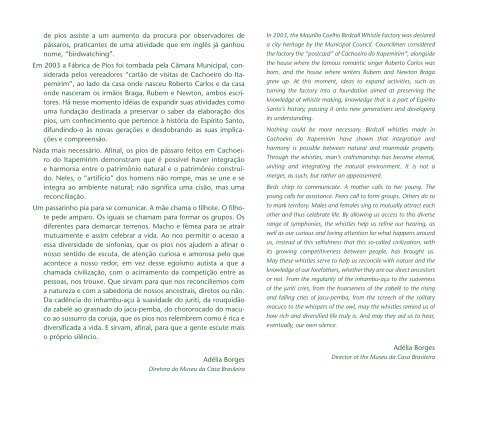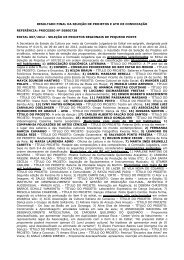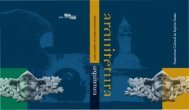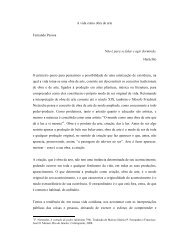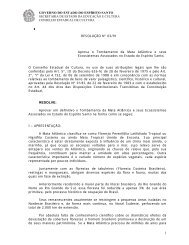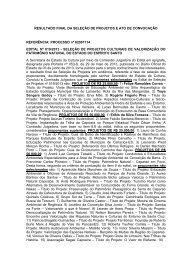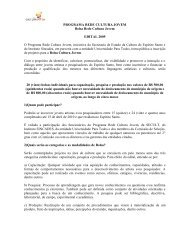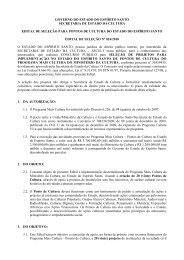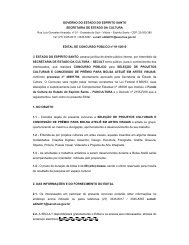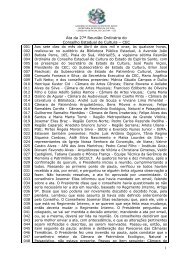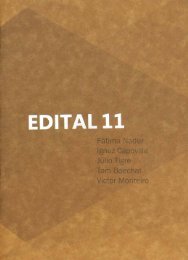You also want an ePaper? Increase the reach of your titles
YUMPU automatically turns print PDFs into web optimized ePapers that Google loves.
de pios assiste a um aumento da procura por observadores de<br />
pássaros, praticantes de uma atividade que em inglês já ganhou<br />
nome, “birdwatching”.<br />
Em 2003 a Fábrica de Pios foi tombada pela Câmara Municipal, considerada<br />
pelos vereadores “cartão de visitas de Cachoeiro do Itapemirim”,<br />
ao lado da casa onde nasceu Roberto Carlos e da casa<br />
onde nasceram os irmãos Braga, Rubem e Newton, ambos escritores.<br />
Há nesse momento idéias de expandir suas atividades como<br />
uma fundação destinada a preservar o saber da elaboração dos<br />
pios, um conhecimento que pertence à história do Espírito Santo,<br />
difundindo-o às novas gerações e desdobrando as suas implicações<br />
e compreensão.<br />
Nada mais necessário. Afinal, os pios de pássaro feitos em Cachoeiro<br />
do Itapemirim demonstram que é possível haver integração<br />
e harmonia entre o patrimônio natural e o patrimônio construído.<br />
Neles, o “artifício” dos homens não rompe, mas se une e se<br />
integra ao ambiente natural; não significa uma cisão, mas uma<br />
reconciliação.<br />
Um passarinho pia <strong>para</strong> se comunicar. A mãe chama o filhote. O filhote<br />
pede amparo. Os iguais se chamam <strong>para</strong> formar os grupos. Os<br />
diferentes <strong>para</strong> demarcar terrenos. Macho e fêmea <strong>para</strong> se atrair<br />
mutuamente e assim celebrar a vida. Ao nos permitir o acesso a<br />
essa diversidade de sinfonias, que os pios nos ajudem a afinar o<br />
nosso sentido de escuta, de atenção curiosa e amorosa pelo que<br />
acontece a nosso redor, em vez desse egoísmo autista a que a<br />
chamada civilização, com o acirramento da competição entre as<br />
pessoas, nos trouxe. Que sirvam <strong>para</strong> que nos reconciliemos com<br />
a natureza e com a sabedoria de nossos ancestrais, diretos ou não.<br />
Da cadência do inhambu-açu à suavidade do juriti, da rouquidão<br />
da zabelê ao grasnado do jacu-pemba, do chororocado do macuco<br />
ao sussurro da coruja, que os pios nos relembrem como é rica e<br />
diversificada a vida. E sirvam, afinal, <strong>para</strong> que a gente escute mais<br />
o próprio silêncio.<br />
Adélia Borges<br />
Diretora do Museu da Casa Brasileira<br />
In 2003, the Maurílio Coelho Birdcall Whistle Factory was declared<br />
a city heritage by the Municipal Council. Councilmen considered<br />
the factory the “postcard” of Cachoeiro do Itapemirim”, alongside<br />
the house where the famous romantic singer Roberto Carlos was<br />
born, and the house where writers Rubem and Newton Braga<br />
grew up. At this moment, ideas to expand activities, such as<br />
turning the factory into a foundation aimed at preserving the<br />
knowledge of whistle making, knowledge that is a part of Espírito<br />
Santo’s history, passing it onto new generations and developing<br />
its understanding.<br />
Nothing could be more necessary. Birdcall whistles made in<br />
Cachoeiro do Itapemirim have shown that integration and<br />
harmony is possible between natural and manmade property.<br />
Through the whistles, man’s craftsmanship has become eternal,<br />
uniting and integrating the natural environment. It is not a<br />
merger, as such, but rather an appeasement.<br />
Birds chirp to communicate. A mother calls to her young. The<br />
young calls for assistance. Peers call to form groups. Others do so<br />
to mark territory. Males and females sing to mutually attract each<br />
other and thus celebrate life. By allowing us access to this diverse<br />
range of symphonies, the whistles help us refine our hearing, as<br />
well as our curious and loving attention for what happens around<br />
us, instead of this selfishness that this so-called civilization, with<br />
its growing competitiveness between people, has brought us.<br />
May these whistles serve to help us reconcile with nature and the<br />
knowledge of our forefathers, whether they are our direct ancestors<br />
or not. From the regularity of the inhambu-açu to the suaveness<br />
of the juriti cries, from the hoarseness of the zabelê to the rising<br />
and falling cries of jacu-pemba, from the screech of the solitary<br />
macuco to the whispers of the owl, may the whistles remind us of<br />
how rich and diversified life truly is. And may they aid us to hear,<br />
eventually, our own silence.<br />
Adélia Borges<br />
Director of the Museu da Casa Brasileira


